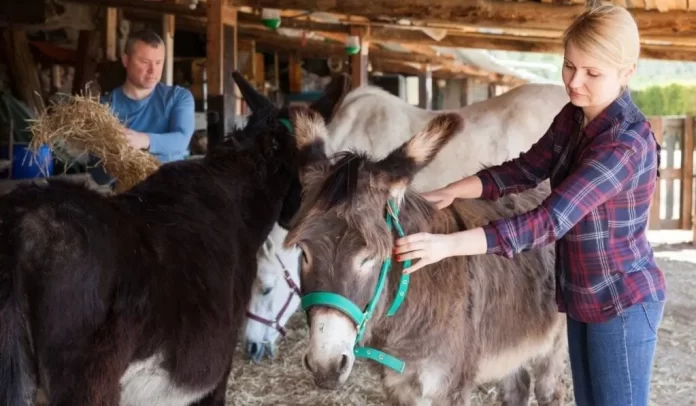Donkeys are remarkably hardy and adaptable animals that can bring enormous joy to their owners. However, like all living beings, they have specific care requirements that must be met to ensure their health and happiness. This blog post aims to shed light on the essentials of donkey care: feeding, grooming, and other basic needs, so if you’re considering browsing through sale ads, you’ll know exactly what to do.
Table of Contents
Feeding: Providing Proper Nutrition
Donkeys are grazing animals. In their natural habitat, they eat a variety of grasses and other vegetation. However, domestic donkeys often don’t have access to a wide variety of forage, so it’s important to supplement their diet appropriately.
The mainstay of a donkey’s diet should be high-quality hay or straw. As a rough guide, donkeys require about 1.5% to 2.5% of their body weight in dry matter per day. So, a donkey weighing 200 kg needs about 3 kg to 5 kg of dry food a day, depending on its age, work, and physiological status. In contrast to horses, donkeys require fewer calories and tend to gain weight easily, so it’s critical to monitor their food intake to avoid obesity.
While browsing sale ads, you might notice mentions of specific diets. This is a sign that the seller is knowledgeable and caring. Additionally, donkeys should always have access to clean water. Salt blocks should be available to compensate for any mineral deficiencies in their feed.
Grooming: Keeping Your Donkey Healthy and Happy
Grooming is not just about keeping your donkey looking good, but it also plays a crucial role in their health. Regular grooming allows you to check for any skin issues, such as cuts, sores, or signs of parasites.
A good grooming routine involves brushing your donkey’s coat to remove dirt and loose hair. Use a stiff brush for the body and a softer one for the face. Also, clean your donkey’s hooves regularly. This can help prevent infections and allows you to check for any signs of injury or disease, such as lameness. When checking out donkeys for sale, ask about their current grooming routine to ensure you can keep up with it.
Basic Needs: Shelter, Exercise, and Socialization
Beyond feeding and grooming, donkeys have other basic needs. These include shelter, exercise, and socialization.
Shelter
While donkeys have a thick coat that can withstand cold temperatures, they still need a shelter to protect them from severe weather conditions. This shelter should be dry and well-ventilated. If the weather is extremely cold or wet, additional warmth might be needed, such as a blanket. Also, consider the shelter facilities you have at your disposal.
Exercise
Donkeys are naturally active animals that need regular exercise to maintain their health. This could include walking, trotting, or even playing with a ball in a paddock. Lack of exercise can lead to obesity and other health problems. So, ensure your donkey has plenty of space to move around and indulge in some playtime.
Socialization
Donkeys are social creatures that thrive on companionship. They are happiest when kept with other donkeys, but they can also bond with other animals like horses or goats. They need daily interaction with their human caregivers too. Ensure to provide enough social interaction for your donkey to prevent loneliness and stress.
Healthcare: Regular Check-ups and Vaccinations
Just like any other pets, donkeys also require regular health check-ups and vaccinations. Establish a good relationship with a local vet who is familiar with donkeys and their specific needs. Regular check-ups can help identify any potential health issues early and ensure your donkey gets the appropriate care. This can include routine vaccinations, deworming, dental care, and hoof care.
While scanning through sale ads, inquire about their medical history and any recurring health issues. It’s crucial to know what you’re getting into. A well-maintained health record is usually a sign of a well-cared-for donkey.
Training and Handling: Building a Trusting Relationship
Building a relationship based on trust with your donkey is crucial. Donkeys are intelligent creatures that respond well to positive reinforcement training. Taking time to train them not only improves their behaviour and handling but also strengthens your bond with them.
It’s advisable to learn about donkey psychology and effective, kind training methods. Understand that patience is key when working with donkeys. When perusing “donkeys for sale,” make sure to ask about their previous training and handling. It will give you an insight into their behaviour and what to expect, enabling a smoother transition to their new home.
In conclusion, owning a donkey is a responsibility that comes with plenty of rewards. By adequately meeting their needs and providing the necessary care, you can ensure a healthy, happy life for your donkey and a deep, enriching companionship for you.
Final Thoughts: Know Your Donkey
Every donkey is unique, with individual needs, personalities, and preferences. Understanding your specific donkey and paying attention to their physical and emotional signals is crucial in maintaining their health and happiness.
Donkey care is a commitment. Feeding, grooming, and meeting their basic needs should be taken seriously. With proper care, donkeys can lead healthy lives and form deep, rewarding bonds with their human caregivers. Remember, the effort invested in their care is directly proportional to the joy and companionship they offer in return.








